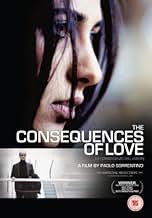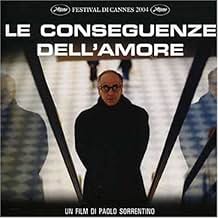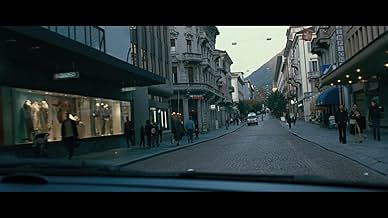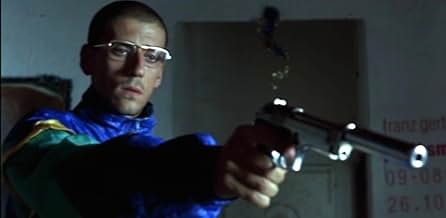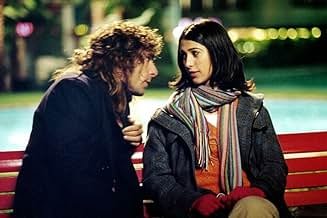An introverted man's life changes completely when he finds himself attracted to a young barmaid.An introverted man's life changes completely when he finds himself attracted to a young barmaid.An introverted man's life changes completely when he finds himself attracted to a young barmaid.
- Awards
- 20 wins & 21 nominations total
- Pippo D'Antò
- (as Enzo Vitagliano)
- Director
- Writer
- All cast & crew
- Production, box office & more at IMDbPro
Featured reviews
This initially unsympathetic character, a scowling, taciturn, curt man on the verge of 50, a man who won't even reply in kind to chambermaids and waitresses who say hello and goodbye, becomes at one point someone the spectator cares deeply about. At one point in his non-life, Titta decides to feel concern about appearing "ridiculous". The first half of the film may be described as "slow" by some. It does indeed reveal Di Girolamo's days and nights in that hotel at an oddly disjoined, deliberate pace, revealing seemingly mundane and irrelevant details. However, scenes that may have seemed unnecessary reveal just how essential they are as this masterfully constructed and innovative film unfolds before your eyes. The existence of Titta Di Girolamo - the man with no imagination, identity or life, the unsympathetic character you unexpectedly end up loving and feeling for when you least thought you would - is also conveyed with elegantly edited sequences and very interesting use of music (one theme by the Scottish band Boards of Canada especially stood out).
Never was the contrast between the way Hollywood and Italy treat mobsters more at odds than since the release of films such as Le Conseguenze dell'Amore or L'Imbalsamatore. Another interesting element was the way in which the film made use of the protagonist's insomnia. Not unlike The Machinist (and in a far more explicit way, the Al Pacino film Insomnia), Le Conseguenze dell'Amore uses this condition to symbolise a deeper emotional malaise that's been rammed so deep into the obscurity of the unconscious, it's almost impossible to pin-point its cause (if indeed there is one).
The young and sympathetic hotel waitress Sofia (played by Olivia Magnani, grand-daughter of the legendary Anna) and the memory of Titta's best friend, a man whom he hasn't seen in 20 years, unexpectedly provide a tiny window onto life that Titta eventually (though tentatively at first) accepts to look through again. Though it's never explicitly spelt out, the spectator KNOWS that to a man like Titta, accepting The Consequences of Love will have unimaginable consequences. A film without a single scene of sex or violence, a film that unfolds in its own time and concedes nothing to the spectator's expectations, Le Conseguenze dell'Amore is a fine representative of that small, quiet, discreet Renaissance that has been taking place in Italian cinema since the decline of Cinecittà during the second half of the 70s. The world is waiting for Italy to produce more Il Postino-like fare, more La Vita è Bella-style films... neglecting to explore fine creations like Le Conseguenze dell'Amore, L'Imbalsamatore and others. Your loss, world.
Somewhere at the beginning of the film, a man walking on a pavement turns to look at a woman and in doing so hits a lamp post. The audience erupts into a volcano of laughter innocently. But isn't that brief shot the synopsis of the film, that entertains you for 2 hours? While the film is a wonderful blend of black comedy (e.g., using a stethoscope to listen to a neighbor's conversation in the adjoining hotel room), the film builds on what Buster Keaton and Jacques Tati had introduced to cinema earlier--stoic faces that leads to comedy quite in contrast to the equally intelligent world of Robin Williams or the heartwarming Danny Kaye. A sudden frenzy of activity transforms an otherwise stoic character while moving money from the hotel to the bank is reminiscent of Tati's works.
But the film is not mere comedy. The anti-automation statement (cash counting and the reaction of the bank staff to the statements relating to it, the dummy that acts as an ineffectual warning to the speeding lady, the reference to "Moulimix" as the fictitious "company" he works for, etc.) are several cues that the director is offering a loaded comedy to the viewer. Laugh, yes, but reflect on it and enjoy further..
The movie's strength lies in is brief, staccato script (by director Paul Sorrentino) that offers comedy that is mixed with philosophy ("Truth is boring," "Dad is dead, but nobody told him," "Bad luck does not exist--it is the invention of the losers and the poor". Then the director goes on to provide you with a fascinating lecture from the main character on insomniacs. You will not sleep through this lecture.
Sorrentino provides entertainment pegged to the subject the Italians know best--the Mafia. It is an existential mafia film.
There is a loaded philosophical sequence where a young girl, sitting opposite the lead character Titta Di Girolamo, reads aloud a passage from a book: "Whatever he wants can happen. What a fine mess. That is the advantage of using memories to excite oneself. You can own memories, you can buy even more beautiful ones. But life is more complicated, human life especially so, a frightening, desperate adventure. Compared to this life of formal perfectionism, cocaine is nothing but a stationmaster's pastime. Let us return to Sophie.. We become poetic as we admire her being, beautiful and reckless, the rhythm of her life flowed from different springs than ours. Ours can only creep along, envious. This force of happiness both exciting and sweet, that animated her, disturbed us. It unsettled us in an enchanting way, but it unsettled us nevertheless. That's the word." The reaction of Titta to the passage is interesting. Titta is himself a cocaine addict. Titta looks at the barmaid of the hotel-his own "formal perfectionism." The following sequence is of Titta calling his own wife and daughter on the phone--a conversation filled more with silence than words. They, too, are Titta's "memories." The final sequence of the film is of Tittas' best friend Dino Guiffre working alone repairing a fault on an electricity pylon in biting wind in a snowy landscape--recalling his own best friend Titta. This is a film about friendship that transcends the mafia.
Since "Truth is boring", the director provides a dessert as part of the fine meal of superb acting (Toni Servillo), good music, clever camera-work (Luca Bigazzi), a beautiful, enigmatic actress (Magnani, grand-daughter of the great, immortal beauty Anna Magnani) and powerful script. The dessert is for the viewer to figure out the truthful feelings of Titta, towards his family members, towards his hotel guests, towards the bar girl, towards the mafia, towards the bankers, towards the hotel owner, and towards his best friend Dino. (Assuming that the viewer accepts the eventuality of how Titta recovered his suitcase from the goons, how does he get inside his car and get it covered with its synthetic cover while he is still inside it?) Perhaps it is Sorrentino's admitted love for the literary works of Louis- Ferdinand Céline that has sculpted the character of Titta. The film's end will remain an enigmatic one for a reflective viewer.
Did you know
- TriviaThe book the girl at the table reads is Louis-Ferdinand Céline's "Voyage au bout de la Nuit" (1932).
- GoofsThe barrel of the tracksuit-clad assassin's fired gun, lying on the hotel mattress while the assassin is packing for departure, appears defective, i.e., rubbery, as the silencer barrel is angled downward. Moments later, after he picks up the gun and points it at the hotel room door, the barrel appears longer and straighter, as it was in the earlier scenes.
- Quotes
Titta: In the world there's a certain kind of cult, with men and women of all social classes, of all ages and of all religions. It is the insomniacs cult. I'm part of it. For ten years. Those who don't belong to the cult sometimes tend to say: "If you can't sleep, you can read, watch TV, study or do something else". That kind of phrase is deeply annoying to the members of the cult. And the reason is simple. Cause the insomniac has only one obsession: to sleep.
- How long is The Consequences of Love?Powered by Alexa
Details
- Release date
- Country of origin
- Official site
- Language
- Also known as
- The Consequences of Love
- Filming locations
- Production companies
- See more company credits at IMDbPro
Box office
- Budget
- €2,000,000 (estimated)
- Gross worldwide
- $2,556,056
- Runtime
- 1h 40m(100 min)
- Color
- Sound mix
- Aspect ratio
- 2.35 : 1

![Watch Trailer [OV]](https://m.media-amazon.com/images/M/MV5BYTE4NzdmOGQtOTU4OC00YTJlLThiYzQtYjkwZWZlMDEzMzVjXkEyXkFqcGdeQXRyYW5zY29kZS13b3JrZmxvdw@@._V1_QL75_UX500_CR0)
